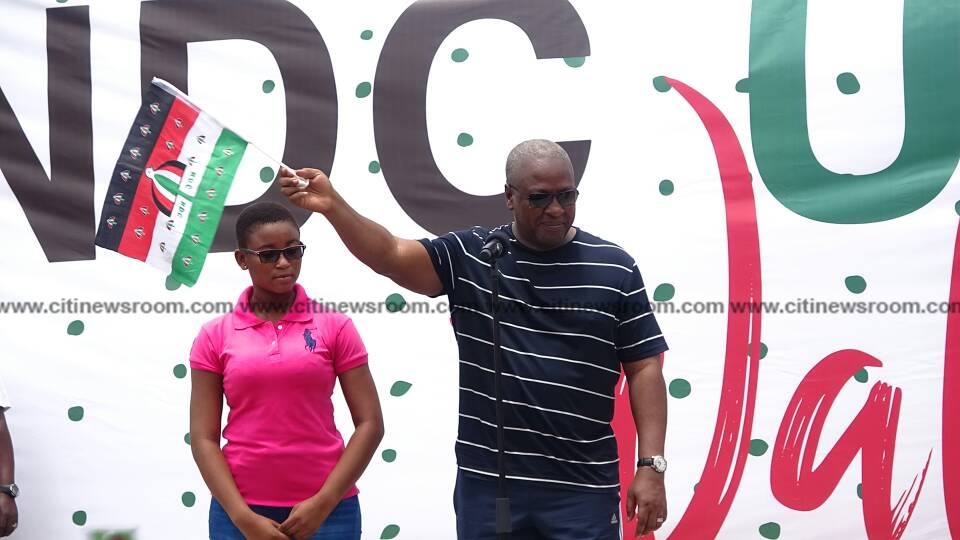The Minister of Lands and Natural resources, John Peter Amewu, has accused former President John Dramani Mahama of being responsible for the influx of Chinese illegal miners into the country.
According to him, the former President “opened the floodgates” for the Chinese, allowing thousands and possibly millions of them to enter the country in order to engage in illegal mining, known as galamsey in Ghana.
Speaking on Eyewitness News, John Peter Amewu said as a result of the huge number of immigrant miners from China, the number of illegal miners that had been deported by the previous government, reportedly hundreds, looked negligible.
“Mahama brought in thousands and millions of Chinese into this country, these are the things that he left. Chinese are our very good friends and we believe they’ll do the right thing, but he opened the floodgates for the Chinese to come and mine irresponsibly in this country. [Even though a number of Chinese operators were deported] what did we come to meet. If 500 Chinese were deported and there are thousands and millions still around that means the floodgates were too wide. We have deported several Chinese miners, running into thousands and several others have been arrested. Excavators were all over the country, over 1, 300 excavators were found in the mining communities when we first imposed the suspension on mining. These are the footprints of Mahama when it comes to small-scale mining.
These comments from the Minister come in the wake of the former President’s delivery of what he considered an unfavourable assessment of government’s anti-galamsey efforts over the weekend.
Speaking at the National Democratic Congress (NDC’s) unity walk in Kumasi on Saturday, Mr. Mahama described the government’s approach in the anti-galamsey campaign as counterproductive.
“…it is true that if we don’t do something about it, it will destroy the environment. But we need to apply wisdom because we’ve chased young people involved in illegal small-scale mining with soldiers in the past in this country, but it didn’t work.”
However, in a scathing response to Mr. Mahama whom he described as a conman, the Lands Minister called on small-scale miners and the general public to disregard the comments, stating that he [Mahama], did not make any meaningful impact on the sector in his four years in charge of the country.
John Peter Amewu also stated in an interview with Citi News that in less than two years, the New Patriotic Party (NPP) government had “created 12 mining districts and 33 satellite districts,” decentralizing the sector and bringing the resources closer to the people in the mining communities.
“What has Mahama been able to do? Today, we have created a lot of mining districts, we’ve created 12 mining districts and 33 satellite districts. We are bringing mining back to the decentralization level. The small-scale mining which was in the status quo was supposed to have mining communities. These were not inaugurated in all the years Mahama was President, we have just inaugurated them, bringing mining to the community of the owners of the resources. Decentralization, this is the approach, so I am so disappointed in [Mahama]. He cannot address the problems. I’m telling the small-scale miners that this gentleman is a con man. He’s deceiving them and if they dare go in for him just because of galamsey, this country will come down.”

Mr. Amewu also remarked on Eyewitness News that even though the President has a right to comment on the issues, he should not attempt to seek political advantage with such a critical national issue.
“Mahama must share his wisdom in a way that Ghanaians must see him as a former resident, not on a political platform trying to incite crowds.”
MMIP, mining ban and Operation Vanguard
The Government in July 2017 stated that ending the illegal mining menace, known as galamsey, will cost about $150 million.
This was captured in the Multilateral Mining Integrated Project (MMIP) document put together by the government.
In the document, the amount is supposed to be financed by statutory funds such as the Mineral Development Fund and an annual budgetary allocation from Government.
Other sources of funding include partnerships with Diplomatic Missions (Funding/Technical Support), Civil Societies, Corporate bodies and other funding organizations through PPP [Public Private Partnership] arrangements among others.
50% of the amount is expected to come from funding partners, 20% from Government of Ghana, 20% from PPP and the rest of the 10% from corporate bodies.
The government through the Ministry of Lands and Natural Resources in January 2017, also placed a six-month ban on the issuance of licenses for small-scale mining and directed all illegal miners to cease the practice and evacuate from the various sites.
The ban was extended by three months in October 2017, and further in March 2018.
Government also set up a task force, known as Operation Vanguard to help enforce the ban and clamp down on illegal mining following renewed concerns about the state of the environment.


Comments are closed.